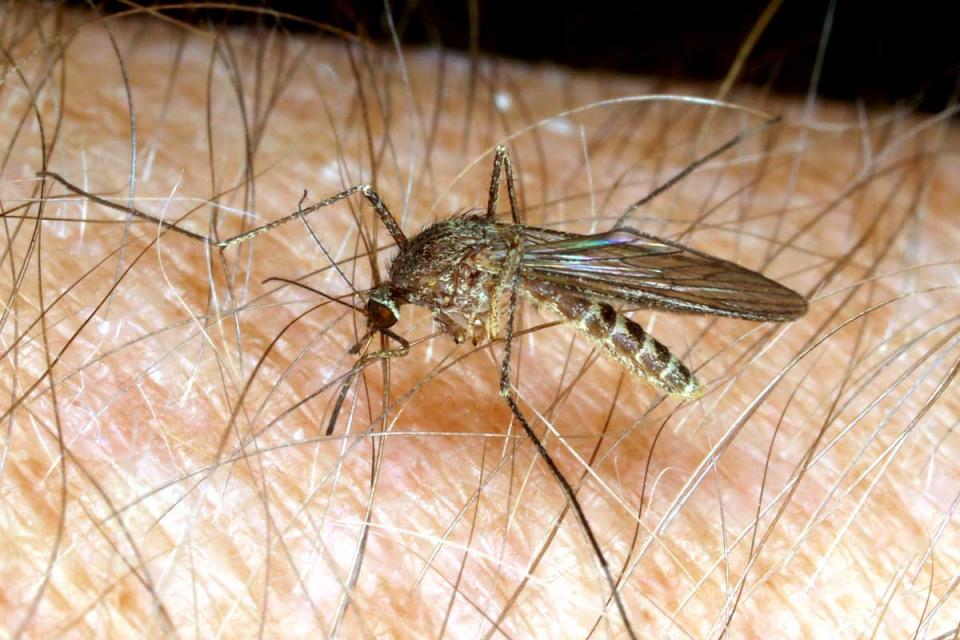
Best Repellents for Mosquitoes and Ticks
May and June are prime months when outdoor blood feeders — like ticks and mosquitoes — are active in Nebraska. Not only are these pests annoying, but they have the potential to spread diseases that pose significant health threats. A variety of preventative measures can help minimize exposure to bites. This article focuses primarily on repellents.

| Active Ingredient Concentration | Formulation/Application to Skin | Hours of Protection |
|---|---|---|
| DEET 5–7% | Aerosol spray, pump spray | 2 hours |
| Picaridin 5% | Pump spray | 3–4 hours |
| DEET 15% | Aerosol spray | 5–6 hours |
| Oil of Lemon Eucalyptus 30% | Pump spray | 6 hours |
| DEET 25–30% | Aerosol spray, pump spray, wipes | 8 hours |
| IR3535 20% | Aerosol spray, pump spray | 8 hours |
| Picaridin 15% | Aerosol spray | 10 hours |
| DEET 98–100% | Pump spray | 10 hours |
| Picaridin 20% | Aerosol spray, pump spray, lotion | 12 hours |
| DEET 34% | Lotion | 12 hours |
Mosquito Repellents
Hundreds of products are sold for mosquito control, but not all are equal in how well they prevent bites. Products with EPA registration number on the label have been evaluated against the pests listed on the label and shown to be effective and safe when applied according to instructions. Products without an EPA registration number marketed as “natural” may provide little to no protection.
Repellents prevent mosquitoes from detecting and biting people. Coverage on exposed skin (not under clothing) must be thorough and can be accomplished using different application methods such as aerosol sprays, pump sprays, skin wipes, and lotions. There are a number of popular brand names (i.e., Off!® Repel®, Coleman®, Saywer, Ben’s®, Natrapel®, Cutter®, Ultrathon®).
Consumers highly rate four active ingredients in repellents:
- DEET,
- Picaridin,
- IR3535, and
- Oil of Lemon Eucalyptus.
DEET Products
DEET has been an effective insect repellent for over 40 years. Research has shown no adverse reactions to people or the environment when used according to label directions.
Some people have experienced bad reactions to DEET and others may dislike the odor and the oily/sticky feeling. DEET is a plasticizer and can damage rubber, plastic, vinyl, and elastic materials (i.e., watches, cameras, sunglasses, and rain jackets) if it comes in contact with them. DEET products are available in a wide variety of concentrations, but products of 25%–30% concentration often provide sufficient and long-lasting (eight hours) protection. It is better to reapply after eight hours rather than use a higher percentage concentration.
DEET-Free Options
An effective and comparable DEET-free option is picaridin 20%, which is odorless, safe on plastics, and does not feel greasy or sticky on skin. Another DEET-free mosquito repellent is oil of lemon eucalyptus 30%. The EPA-registered product offers protection against mosquitoes for up to six hours. Oil of lemon eucalyptus is NOT the same as lemon eucalyptus oil or lemongrass essential oil, so do not be fooled.
Repellent Devices
A product called the Thermacell® Portable Mosquito Repeller is a portable, odorless device that releases the synthetic pyrethroid (d-cis/trans allethrin) to repel mosquitoes within a 15-foot zone of protection. It requires butane cartridges for power and replaceable repellent mats.
On a smaller scale, the battery-powered Off!® Clip-On® Mosquito Repellent clips on to the waistband and releases an insecticide (metofluthrin) vapor into the immediate environment. This may help stationary individuals for a short time, but should not be used as a primary repellent. Products that DO NOT repel mosquitoes effectively and consistently include wearable bracelets, bands, patches, citronella candles, bug zappers, smart phone apps or plug-in ultrasonic devices.
Tick Repellents
Due to the biology and questing behavior of ticks, there are limitations to skin repellents and they should not be relied alone upon to stop tick bites. Luckily, a permethrin 0.5% clothing spray (i.e. Coleman®, Ben’s®, Sawyer, Repel®) is very effective at protecting people from ticks while outdoors. Permethrin is a synthetic pyrethroid used as a contact insecticide and repellent against a wide variety of arthropods. It is not safe for use on skin, but can be sprayed onto clothing, allowed to dry and then remain effective against ticks through multiple washings. It is a good idea to treat clothes, socks, shoes and backpacks before outdoor activities. There are also commercial, pre-treated clothing that can be purchased from stores/online, designed to repel ticks for up to 70 washes.
IMPORTANT: Despite the use of repellents, the best way to avoid a tick bite and tick-borne diseases is to perform a tick check periodically while outdoors and a thorough tick check of your person, children and pets after completing outdoor activities. Put clothing in the dryer for 20–30 minutes to kill ticks which may have hitched a ride.
Last, consult your veterinarian for the safest, most effective preventive measures to protect your pets from mosquitoes and ticks.
Online Master of Science in Agronomy
With a focus on industry applications and research, the online program is designed with maximum flexibility for today's working professionals.
